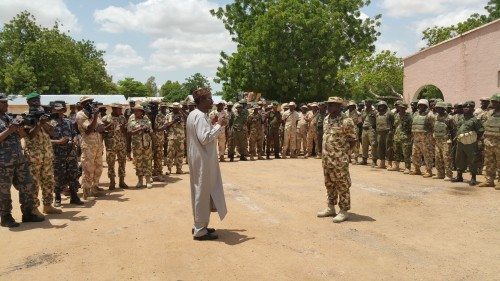
Nigeria returned to democracy in 1999, after two long periods of military rule—1966–79 and 1983–98—during which the military wielded executive, legislative, and judicial power. This has left a historical legacy of a powerful military used to doing whatever it wants with no questions asked. On return to democracy, it also left the country with a political class that is wary of military power, and unwilling and unable to impose democratic civilian oversight of the military.
Lack of oversight has real consequences. The Nigerian military is currently engaged in protracted counter insurgency operations against Boko Haram, and involved in many other internal security operations. It is suffering from an acute readiness crisis. It is now being accepted and acknowledged, even within military and government circles, that the Nigerian military is overstretched, under-manned, grossly under-equipped, ill-trained, and poorly led. To worsen matters, the three services are locked in intense rivalries, with neither the lame-duck chief of defense staff nor the equally powerless minister of defense able to intercede; the service chiefs routinely go over the head of the minister to report to the president, rendering the minister redundant. The services are left to pursue operational approaches individually rather than in concert, and carry prestige projects with no real value to operational capacity, frittering away already scarce and insufficient resources. From 1999 to 2018 Nigeria has been spending on average less than of 0.5 percent of its GDP on defence.
The military faces many proven and unproven allegations of human rights abuses and law of armed conflict violations. To address these, there has been a presidential commission of inquiry on human rights violations and compliance with the rules of engagement, and president Buhari raised the issue in his first inauguration speech and in a speech to the EU Parliament in 2016, promising change. But, years later, there is still insufficient doctrinal guidance and normative material to guide the Nigerian military on the conduct of operations.
As President Buhari begins his second term, there is a lot that both the executive and the legislative branches need to do to reform the defense sector to address, among other things, the issues of readiness and democratic civilian oversight. Such reforms will certainly not come from within the military.
Among other things, successful reforms require four changes. First, the Buhari administration should appoint a minister of defense with a strong personality and extensive knowledge of the Nigerian military. The outgoing minister, though a retired general, struggled unsuccessfully to stamp his authority over the powerful service chiefs. By date of entry, he was junior to the service chiefs. Nevertheless, a retired military general would likely be best suited. Second, the current imprecise chain of command running from the president through to the minister of defense, chief of defense staff, down to the three service chiefs and commander of joint task forces, should be reorganized and streamlined.
Third, the process needs support from the Nigerian military top brass, retired Nigerian military officers with the requisite subject matter expertise, as well as Nigeria’s foreign allies. The United States and United Kingdom in particular should move from just providing training to providing equipment and live satellite imagery if the Nigerian military is to attain the readiness status needed to prevail over Boko Haram as part of the global counter terrorism effort. Such imagery has been more difficult to attain following the mistaken bombing in 2017 of an IDP camp in Borno state by the Nigerian Air Force, which led to more than one hundred confirmed deaths. Finally, there needs to be a review of the contentious Section 217 (2) c, and d, of the Nigerian constitution, which allows the military to be engaged in domestic operations, especially in light of the sometimes tragic consequences of such involvement. For such reform to take root, it will require not only the leadership of the Buhari administration, but the close involvement of the legislature.
Sadeeq Garba Shehu is a private defense and security consultant in Nigeria. He is a former group captain in the Nigerian air force and former deputy head of safety and security at the African Union Commission.
Disclaimer:
As an editorial policy, Breaking Times neither oppose nor endorse any opinion and contribution expressed by our writers and contributors. Contributions are strictly that of the writers only and do not represent the opinions of Breaking Times.
Op-Ed Contribution:
Our platform is for you. Want to submit an Op-Ed? If yes, kindly send your article and short biography to youreport@thebreakingtimes.com
You may be interested

Arsenal Equal Chelsea’s London Derby Feat After 5-1 Win Vs Palace
Webby - December 21, 2024Arsenal equaled Chelsea’s London derby achievement following their 5-1 win against Crystal Palace in Saturday’s Premier League game at Selhurst…

Haaland Backs Guardiola To Turn Man City’s Poor Form Around
Webby - December 21, 2024Erling Haaland had said he and his Manchester City teammates are still backing manager Pep Guardiola to turn the team’s…

PSG To Reignite Interest In Osimhen
Webby - December 21, 2024Paris Saint-Germain have contacted Napoli to discuss signing Victor Osimhen in January, according to reports in France.It is reported that…

















![American Pastor, David Wilson Seen Eating The Box Of Woman Who Isn’t His Wife [Video]](https://onlinenigeria.com/wp-content/uploads/2019/10/american-pastor-david-wilson-seen-eating-the-box-of-woman-who-isnt-his-wife-video-150x150.jpg)









